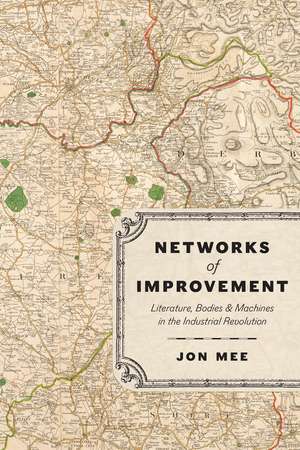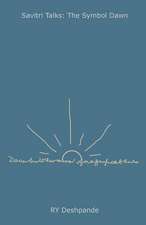Networks of Improvement: Literature, Bodies, and Machines in the Industrial Revolution
Autor Professor Jon Meeen Limba Engleză Paperback – 10 oct 2023
Working against the stubbornly persistent image of “dark satanic mills,” in many ways so characteristic of literary Romanticism, Jon Mee provides a fresh, revisionary account of the Industrial Revolution as a story of unintended consequences. In Networks of Improvement, Mee reads a wide range of texts—economic, medical, and more conventionally “literary”—with a focus on their circulation through networks and institutions. Mee shows how a project of enlightened liberal reform articulated in Britain’s emerging manufacturing towns led to unexpectedly coercive forms of machine productivity, a pattern that might be seen repeating in the digital technologies of our own time. Instead of treating the Industrial Revolution as Romanticism’s “other,” Mee shows how writing, practices, and institutions emanating from these industrial towns developed a new kind of knowledge economy, one where local literary and philosophical societies served as important transmission hubs for the circulation of knowledge.
| Toate formatele și edițiile | Preț | Express |
|---|---|---|
| Paperback (1) | 215.85 lei 3-5 săpt. | +17.60 lei 4-10 zile |
| University of Chicago Press – 10 oct 2023 | 215.85 lei 3-5 săpt. | +17.60 lei 4-10 zile |
| Hardback (1) | 617.39 lei 6-8 săpt. | |
| University of Chicago Press – 10 oct 2023 | 617.39 lei 6-8 săpt. |
Preț: 215.85 lei
Nou
Puncte Express: 324
Preț estimativ în valută:
41.31€ • 42.67$ • 34.38£
41.31€ • 42.67$ • 34.38£
Carte disponibilă
Livrare economică 04-18 martie
Livrare express 15-21 februarie pentru 27.59 lei
Preluare comenzi: 021 569.72.76
Specificații
ISBN-13: 9780226828381
ISBN-10: 0226828387
Pagini: 288
Ilustrații: 10 halftones
Dimensiuni: 152 x 229 x 23 mm
Greutate: 0.46 kg
Ediția:1
Editura: University of Chicago Press
Colecția University of Chicago Press
ISBN-10: 0226828387
Pagini: 288
Ilustrații: 10 halftones
Dimensiuni: 152 x 229 x 23 mm
Greutate: 0.46 kg
Ediția:1
Editura: University of Chicago Press
Colecția University of Chicago Press
Notă biografică
Jon Mee is professor in the Department of English and Related Literatures at the University of York, where he is also affiliated with the Center for Eighteenth-Century Studies. He is the author of five books, including Print, Publicity, and Popular Radicalism in the 1790s: The Laurel of Liberty and Conversable Worlds: Literature, Contention, and Community, 1762 to 1830.
Cuprins
Introduction
Part One: Networks and Institutions
1 Power, Knowledge, and Literature
2 The Collision of Mind with Mind: Manchester and Newcastle, 1781–1823
3 Improvement Redux: Liverpool, Leeds, and Sheffield, 1812–32
Part Two: Bodies and Machines
4 Three Physicians around Manchester
5 Hannah Greg’s Domestic Mission
6 An Inventive Age
7 Lives, Damned Lives, and Statistics
Acknowledgments
Abbreviations
Notes
Bibliography
Index
Part One: Networks and Institutions
1 Power, Knowledge, and Literature
2 The Collision of Mind with Mind: Manchester and Newcastle, 1781–1823
3 Improvement Redux: Liverpool, Leeds, and Sheffield, 1812–32
Part Two: Bodies and Machines
4 Three Physicians around Manchester
5 Hannah Greg’s Domestic Mission
6 An Inventive Age
7 Lives, Damned Lives, and Statistics
Acknowledgments
Abbreviations
Notes
Bibliography
Index
Recenzii
“Richly archival and powerful in its conceptions, Mee’s Networks of Improvement boldly goes where few literary historians have been before, into the heartlands of industrializing Britain for a magisterially orchestrated and methodologically groundbreaking study. Mee has given us a picture of British intellectual and social relationships that will stand unmatched for a long time to come.”
“Mee offers a sophisticated account of reading as a social practice central to the circulation of knowledge, both grand and granular, responsive to large questions with local particularities. Networks of Improvement is comprehensive, clearly written, and carefully organized.”
"A capsule review cannot do justice to Networks of Improvement. . . . The book is immensely learned and theoretically sophisticated (Bruno Latour occupies a prominent place), and it is well grounded in both primary and secondary texts and supported by extensive original research in the archives. . . . Essential."
"Be prepared to be surprised by Networks of Improvement. The early industrial revolution is not a place that conjures up images of improvement, or liberalism, or advances in medical practice. . . . Jon Mee’s immensely learned book complicates and revises our images."


















